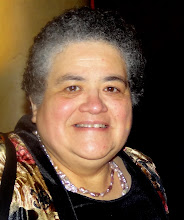This is a blog about teaching Latin American history to college students. There are legions of college professors in our nation's colleges and universities, most of whom teach United States or European history. The rest of us cover the rest of the world which, if you look at a globe, is quite a lot of territory.
I am beginning my seventeeth year at the University of Rhode Island where I teach Latin American History, and Women's Studies. People always ask me which country I specialize in. While my research is on Central America (a region, obviously, rather than a country) the truth is I am a generalist (more poetically, a Renaissance woman) since I cover 20 countries and over five hundred years. Sometimes I envy those who have a smaller bit of real estate for which they are responsible but mostly I love the breadth of understanding of the world that my study of history gives me. It is this breadth of understanding that I hope to give them because while I teach about Latin America, I am really teaching them to look beyond the shores of of this country. If I succeed in arousing their curiosity about Latin America or help them understand a newspaper article about Mexico or a movie about the Brazilian favelas, I will know I have succeeded.
All college professors teach a discipline but our students are people who may, as they attempt to get their degrees, face challenges and troubles we know nothing about. Sometimes it is difficult to know what is a genuine challenge and what is a good excuse because not all of them are mature enough or serious enough about their studies. To teach them effectively, we must reach them where they are and bring them along.
As this summer draws to an end, I am reminded of a student in one of my summer classes this year. She always looked a bit sleepy though she never fell asleep in class or handed her work in late. One day, she arrived at our 8 AM class just as I did, right on the button, and she handed me a large cup of coffee. She explained that she had been afraid that she was going to arrive late because she worked the 5-7:30 AM shift at a local donut shop and the clerk who relieved her had called in late. She didn't want me to be upset about her late arrival, so she brought me a cup of coffee, presumably because I always had a cup of coffee with me when I lectured.
It was a funny little thing but it made me aware--and I had forgotten--that some students work grueling schedules as well as taking classes and studying. It was an important reminder of just who I was dealing with.
URI is a state university. Many of our students are working-class. Many are the first in their families to go to college. They will never know the cushy college experience of their peers at the Ivy League colleges, and most will graduate with a staggering amount of debt. We who care about them must keep these things in mind. This is a blog about what it's like to teach them; about some of the shenanigans that they get up to; about the state and academic politics we have to deal with as we strive to deliver the curriculum.
As August draws to a close, I am working on syllabi and preparing quizzes; trying to get a jump on the avalanche of work that hits as soon as the first school bell rings. As one wag said, for a teacher, August is one long Sunday night.
Wednesday, August 12, 2009
Subscribe to:
Post Comments (Atom)

No comments:
Post a Comment